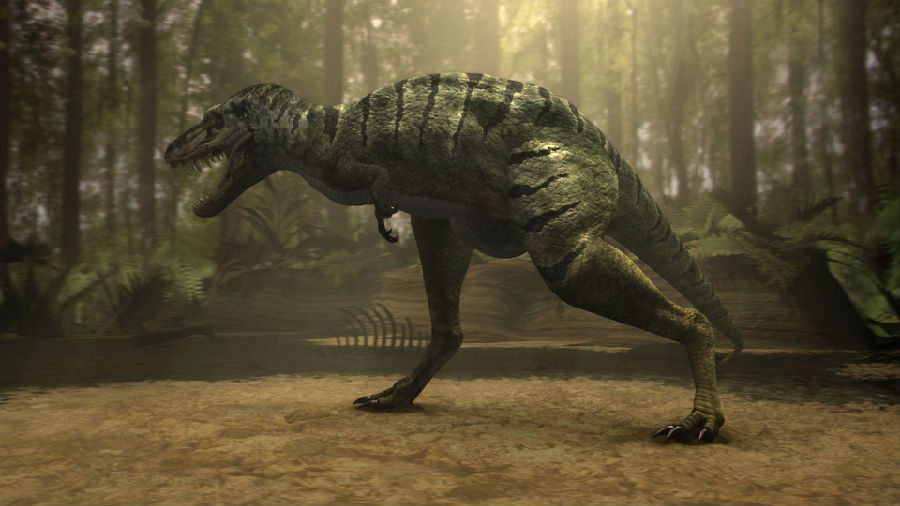We can look at modern jaguar to see animals that sort of play the same role that Ceratosaurus does.
我们可以参考现代的美洲豹,来看一看差不多扮演着角鼻龙角色的动物。
Jaguars take on medium to smaller prey, but it's hesitant to attack really big things.
美洲虎捕猎中型和小一些的猎物,但它在攻击真正大的动物时就会犹豫。
Now, compare that to Allosaurus who's much heavier and more powerful, if Ceratosaurus was the jaguar of Jurassic, then Allosaurus was the tiger.
与之相比,异特龙要重得多也更加有力,如果说角鼻龙是侏罗纪的美洲豹,那异特龙就相当于老虎。
Like modern tigers, Allosaurus was the ultimate predator of its domain.
和现代虎一样,异特龙是它的领域里的终极掠食者。

It could take on anything it wanted.
它能够与任何它想与之较量的东西较量。
The life of a predator rests on its ability to capture prey.
掠食者的生命依靠它捕获猎物的能力。
But with less weight to carry, Ceratosaurus may have been more agile.
不过角鼻龙的体重较轻,可能会更加灵活。
In a foot race, Ceratosaurus would probably win, agility-wise, because it has a smaller body mass.
要是比拼脚力,角鼻龙可能会赢,它因为体重要轻一些灵活度上更好。
So basically, their body forms are very similar.
基本上来说,它们的体型非常相似。
But Ceratosaurus, because it is gonna be a little bit smaller, probably a bit more agile than Allosaurus.
但是因为角鼻龙更小一点儿,可能会比异特龙更加灵活一点点。
Because Ceratosaurus is not as robust as Allosaurus, it is a little bit quicker and certainly more agile.
因为角鼻龙没有异特龙强壮,它会更快一点儿而且肯定更加灵活。
So even though Allosaurus is a fast dinosaur, he's not nearly as quick as Ceratosaurus.
所以尽管异特龙是一个速度很快的动物,可是还是远不及角鼻龙快。
But the massive tail of Allosaurus also gave it an advantage when it came to speed and agility.
不过异特龙的巨大尾巴在速度和灵活度方面也给了它一个优势。
Allosaurus is a slightly more advanced, slightly more specialized meat eater.
异特龙是稍微先进一点儿,稍微特化一些的肉食者。
Its tail is a little more adapted for agility.
它的尾巴为了灵活度改变得更多一些。
It has more of a tapering to the tail, not a deep tail.
它的尾巴更趋于锥形,而不是突然变细的。
And therefore it can use it as a counterbalance better in order to turn quickly.
所以它在急速转弯时能更好地用尾巴做一个平衡物。
What's interesting is when we actually look inside the head, we see an inner-ear structure that suggests that this kind of quick movements are more important for Allosaurus than for Ceratosaurus.
更有趣的是我们在检查它的头部时,我们看到的内耳结构表明这种快速移动对于异特龙要比角鼻龙重要。
But to offset its smaller size and less powerful body, Ceratosaurus relied on a special adaptation for survival: it hunted in pairs.
为了弥补它更小的体型和没那么强壮的身体,角鼻龙依靠一直特别的生存适应策略:它们成对狩猎。
It wouldn't be unusual for predators like Ceratosaurus to hunt in pairs.
成对狩猎对于像角鼻龙这样的掠食者来说并不罕见。
Smaller predators are much more effective when they hunt in groups.
较小的掠食者在成群猎食的时候效率更高。
And we see that in members of the Raptor family.
我们在迅猛龙家族见证了那一点。
They offset their small sizes by working in a group to take on much larger prey.
它们通过成群狩猎来弥补它们的小体型来与更大的猎物较量。
Now, these dinosaurs were much larger than Raptors, so chances are they would not hunt in the really large groups.
这两种恐龙比迅猛龙大得多,所以估计不会组成那么大的群体。
But since they related to birds, then it would make sense that they would probably hunt with a mate.
不过因为它们跟鸟类有关系,所以也能理解它们可能会和一个同伴一起狩猎。













